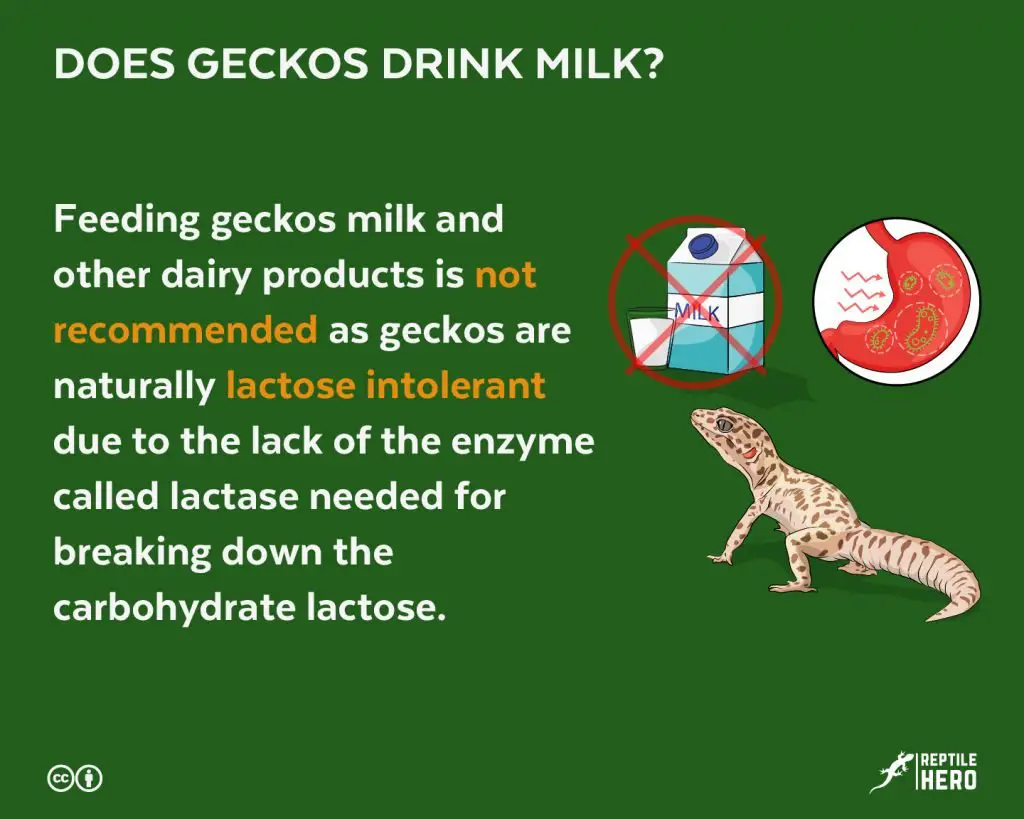Do Geckos Drink Milk? [Think it Twice]
Milk, which is known to have high calcium content, is also recognized as one of the most nutritionally complete food items available on Earth. So it’s not surprising to hear about gecko parents wanting to give their baby geckos some milk too, especially since they are at risk of developing the metabolic bone disorder. But is it actually a good idea?
Geckos do drink milk and dairy, owners and researchers have documented this. However, feeding geckos milk and other dairy products is not recommended as geckos are naturally lactose intolerant due to the lack of the enzyme called lactase needed for breaking down the carbohydrate lactose.
A few experts go so far as to claim that we could hypothetically survive on a milk-only diet – that’s how great it is! However, milk and dairy could actually cause more harm than good for our little gecko companions on most occasions. Continue reading to find out why!
Geckos and Milk: What Does Science Have to Say?
A friend of mine once joked about wanting to give his crestie a bottle cap full of cereal crumbs and milk in the morning so they could have breakfast together. I laughed in response and started getting curious about what would happen if he actually did it. So here’s everything I learned through years of experience and research.
Milk Production and Lactose Intolerance
Geckos are lactose intolerant. Indeed, as a general rule, all animals without mammary glands like geckos that do not produce milk for the nourishment of their young are lactose intolerant by nature.
Though both captive-bred and wild geckos have been observed to voluntarily consume milk, they lack the appropriate enzymes necessary to properly break down the most available sugar in most milk.
In the year 1758, Carolus Linnaeus, a prominent taxonomist, named a group of animals Mammalia after a physical characteristic unique to the group’s females – mammary glands or mammae [1].
However, scientists say that the production of milk-like secretions from the skin glands of mammalian ancestors, collectively called synapsids, have actually emerged 310 million years ago, way before dinosaurs even walked the earth.

Since fully grown mammals have specific diets that are too difficult to maintain and/or digest for young and vulnerable offspring, milk became an important source of energy and nutrients for growing animals. It is also because of this dependency on milk that mammals have developed the ability to produce an enzyme in their small intestines called beta-d-galactosidase – more commonly known as lactase [2].
Lactase breaks down lactose, a type of complex sugar found only in milk in high abundance, into its simple sugar components, specifically glucose and galactose. However, most mammals including humans typically experience a substantial decrease or a total cease in lactase production by the time they are adults. During adulthood, most, if not all, mammals become lactose intolerant.
Lactose Intolerant Geckos
Now, what about geckos and reptiles in general?
Numerous literary experts across the globe have documented various folk tales of reptiles and amphibians drinking milk from vastly different cultures such as Asia and Europe [3]. Most of these stories claim that nocturnal species, including lizards, sneak into farmlands during nightfall to suckle milk directly from cow utters. Others are said to even go for human milk and blood.
Honestly, when I heard stories like those during my childhood, I thought they were all probably just made up. I think I was in elementary when I first witnessed it myself, a small house gecko was drinking up the leftover milk in my cereal bowl.
Despite being both incapable of producing milk for their young as well as breaking down the lactose in milk, several geckos have been sighted to drink milk regardless of their species-specific diet (e.g., insectivores, frugivores).
Geckos species that have been documented to have consumed milk and dairy according to pet owners and researchers [4]:
- Pacific geckos (Gehyra mutilata)
- Gold dust day gecko (Phelsuma laticauda)
- Tropical house gecko (Hemidactylus mabouia)
- Crested geckos (Correlophus ciliatus)
- Common house gecko (Hemidactylus frenatus)
- Gargoyle geckos (Rhacodactylus auriculatus)
- New Caledonian giant geckos (Rhacodactylus leachianus)
- Mourning geckos (Lepidodactylus lugubris)
- Leopard geckos (Eublepharis macularius)
- Tokay geckos (Gekko gecko)
4 Reasons Why Geckos Consume Milk and Other Dairy Products
Given the fact that geckos can neither produce and break down milk properly, most people are still left wondering exactly why geckos continue to consume it.
The 4 reasons that can explain why geckos eat and drink dairy are as follows:
- Opportunistic feeding. Wild geckos are naturally opportunistic feeders, eating what’s readily available despite such options not being a part of their natural diets of insects and/or fruit. This is especially evident in house-dwelling geckos and those that live near human settlements [4].
- Extreme starvation and dehydration. As a matter of self-preservation, geckos and reptiles are likely to consume peculiar food items like dairy to survive.
- Familiar appearance. Although it isn’t a common occurrence, some geckos mistake shredded cheeses for worms of a similar color such as mealworms. It’s the same with liquid dairy products that are similar to honey or rotten fruit in consistency.
- Sweetness. Geckos also seem to develop a liking for sweet dairy products. This could be due to the fact that frugivores naturally do like sweet food items such as fruit, pollen, honey, and coconut water. However, owners of insectivores like leos and tokays have also observed such preferences.
What Can Geckos Get from Drinking Milk? (Nutritional Value)
On average, milk is a nutrient-dense food that has high levels of macronutrients, vitamins, and minerals. Most notably, it is one of the best sources of easily digestible calcium. Unfortunately, it also has carbohydrates in the form of sugar, mainly lactose, which is not part of a gecko’s natural diet.
Through the years, I’ve met and come across people who would give their geckos milk as a “healthy” treat or as some sort of calcium supplement mixed regularly into their beloved pets’ diets. During that time I was still new to the community but I was skeptical of such practices.
Nevertheless, I do agree with them on the fact that milk is chock-full of nutrients so I get the “it’s good for them” thinking.
Nutrients present in milk include the following:
- Protein
- Fat
- Calcium
- Phosphorus
- Potassium
- Zinc
- Choline
- Magnesium
- Selenium
- Iodine
- Vitamin A
- Vitamin B2
- Vitamin B12
- Sodium
- Carbohydrates (e.g., lactose, etc.)
Ideally, both insectivorous and frugivorous geckos need carbohydrates in the form of crude fiber to aid in digestion and maintain good gut flora. This is usually found in insects and plant matter. But, as I’ve already mentioned earlier, the carbohydrate present in milk is largely present in the form of a complex sugar referred to as lactose.
Why are milk derivatives used in gecko meal-replacement powders and pastes good?
Although many meal-replacement powders and pastes for geckos contain milk protein isolates, specifically micellar casein and whey protein, it has very low levels to virtually no lactose – usually no more than 5% [2, 5]. So your gecko will not experience any adverse effect from regular consumption of easy-to-serve formulated gecko food products.
Is It Okay For Geckos to Eat or Drink Other Dairy Products?
Overall, geckos shouldn’t be given any dairy products at all. While some products have minimal lactose content, they may also have increased levels of fat, sodium, and sugar but decreased levels of protein.
Aside from milk, the dairy food group includes the following products:
- Cheese
- Butter
- Cream
- Ice cream
- Ghee
- Curd
- Milk drink
- Yogurt
- Kefir
Dairy products have comparable nutritional values with plain whole cow’s milk. Granted, other dairy products can have little to no lactose at all due to a variety of different food processes such as fermentation and heating. After undergoing such treatments, people make the mistake of thinking that low-lactose dairy is pretty much safe and good to give to your gecko.
This is ordinarily claimed by owners and breeders who include yogurt in their gecko’s diet. Pet parents of cresties, for example, usually add yogurt to homemade smoothies for monthly treats. Breeders also give it regularly to their ovulating females to bulk up. Others mix it in just to get their babies to eat more.

However, dairy with reduced lactose is not always better. In fact, it could be a lot more unhealthy for your gecko. To give you a couple of examples, butter has less lactose but more fat, cheese has less lactose but more sodium, and yogurt could have no lactose at all but have tons of other sugars (e.g., glucose).
Because of this, other gecko parents seem to have started considering the use of vegan or plant-based “dairy” products. These are usually made with grains, legumes, and nuts [6]. The issue is that they rarely provide the same nutritional value as regular cow’s milk. Moreover, those base ingredients are generally not good for geckos either.
Can Gecko Eat Yogurts?
In rare cases, some pet owners have been directly instructed by veterinarians to give their sick geckos small amounts of yogurt. This can be given with the use of a needleless syringe, on its own, with some medicine, or mixed into a slurry to help restore or boost their appetite, energy, weight, and digestion.
A yogurt slurry for a sick gecko may include the following ingredients:
- Mashed feeder insects
- Calcium powder
- Vitamin supplements
- Meat-flavored baby food (here on Amazon)
- Organic pureed sweet potato or pumpkin
- Appetite stimulants
But remember that not all yogurts are the same. Flavored yogurts, in particular, are known to have relatively high sugar content.
Generally, organic plain low-fat yogurts are the safest option to give your gecko and such products should meet the following standards [2, 7]:
- Calories lower than 250 per serving
- At least 20% of the Recommended Dietary Allowance (RDA) of calcium
- Distinct “live and active cultures” label
- More than two probiotics cultures (e.g., Lactobacillus acidophilus and Bifidobacterium bifidum)
- Prebiotics ingredient (e.g., inulin)
Final Verdict on Giving Geckos Milk and Dairy
Even though no gecko has died from ingesting milk and dairy so far (at least not to my knowledge), many have suffered from gastrointestinal issues after ingesting such products. Hence, no dairy product should ever be provided to geckos.
Symptoms of gastrointestinal distress include [2]:
- Abdominal cramps
- Diarrhea
- Runny droppings
- Bloating
- Flatulence
- Constipation
Another factor that further complicates this is the fact that our geckos cannot readily communicate their discomfort or pain to us, regular pet parents. We also have limited knowledge of the effect of milk and dairy on our beloved babies.
It is also important to note that the milk and dairy we have available in our markets and grocery stores are processed and sold for human consumption. Moreover, there are still no extensive studies on their actual benefits and risks for geckos or any other reptile for that matter. So my advice is – it’s better to play it safe.
Better and Safer Alternatives
If the only reason you are considering giving your gecko yogurt for the probiotics, a better alternative would be to simply buy a probiotics supplement that is specifically formulated for reptile consumption.
Such supplements are available as a powder, liquid, and gel (here on Amazon). They normally also act as appetite stimuli and come in flavors.
In case calcium is what you are after, you can opt to dust insects with a calcium powder (here on Amazon) or offer it to your gecko as is in a small bowl that you could leave in your baby’s vivarium.
Another way you could give your gecko more calcium is by gut-loading your live feeder insects 24 hours before beefing. You could use calcium powder, milk powder, or any other calcium-rich food item such as bran, apricots, figs, egg yolk, raspberries, and spinach [2].
Takeaways
Yes, there are reports of geckos – both captive-bred and wild specimens – drinking not only milk but many other dairy products.
However, geckos are reptiles and not mammals. As such, they can neither produce milk nor break down lactose which is the primary carbohydrate present as sugar.
The former is true for other dairy products. Even though there are products with reduced lactose content, the reduction affects the levels of other nutrients – negatively and/or positively.
Despite the fact that no gecko deaths have been due to milk and dairy ingestion, there are numerous cases where geckos had experienced gastrointestinal problems because of it.
Sources
[2] https://www.sciencedirect.com/
[3] https://sciencepress.mnhn.fr/sites/default/files/articles/pdf/az2017n1a6.pdf
[4] https://doi.org/10.33256/hb149.3840
[5] https://www.healthline.com/nutrition/foods/milk
[6] https://www.betterhealth.vic.gov.au/health/healthyliving/milk#nutrients-in-milk




![Can You Train Your Gecko? [5 Tricks It Can Learn Now]](https://www.reptilehero.com/wp-content/uploads/2021/02/Gecko-Training-Infographic-768x614.jpg)
![4 Reasons Why Leopard Geckos Get Neutered [and Problems]](https://www.reptilehero.com/wp-content/uploads/2021/04/Can-Gecko-Get-Neutered-768x614.jpg)

